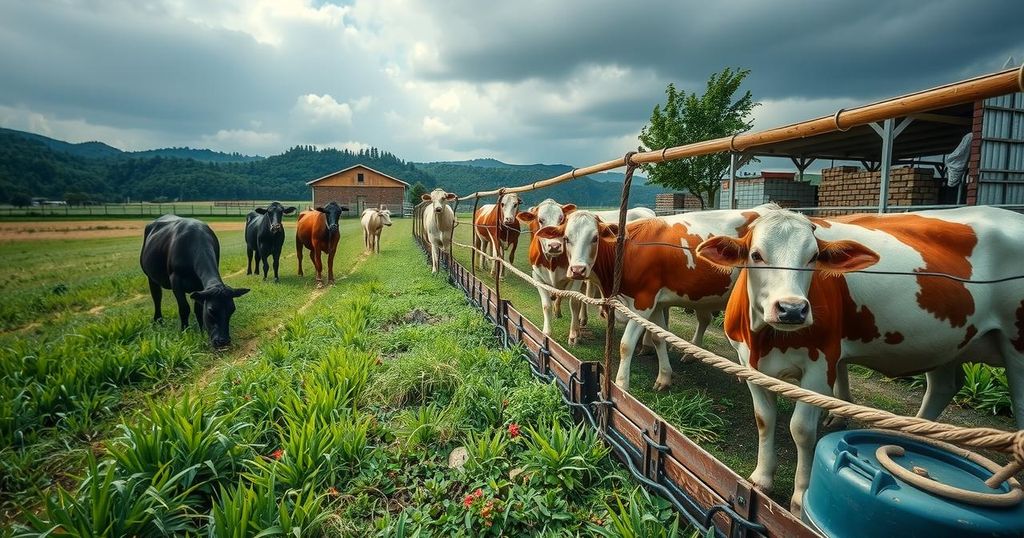This article emphasizes the critical role of livestock in Africa’s food systems and rural economies, advocating for their inclusion in climate policies as assets rather than liabilities. Proper management of livestock can enhance biodiversity, mitigate greenhouse emissions, and support communities facing climate variability. Investments in sustainable livestock practices are essential for achieving environmental goals and promoting food security.
Climate policies should recognize the essential role of livestock in supporting sustainable development and combating climate change. Grazing cattle, when managed sustainably, can contribute positively to addressing climate action while enhancing the resilience of vulnerable communities. In Africa, livestock is integral to food systems and rural economies, with approximately 400 million cattle contributing 30 to 40 percent of the continent’s agricultural GDP. Small amounts of animal protein from livestock are crucial in alleviating malnutrition and providing income in areas with limited alternatives. Despite their importance, livestock are often viewed negatively in environmental discourses, primarily due to their contributions to greenhouse gas emissions and habitat degradation. This perception hampers necessary investment in the livestock sector, leading to a disconnect between climate finance initiatives and the sector’s potential benefits. As global discussions on biodiversity, climate change, and desertification continue, it is vital to reshape the understanding of livestock from perceived liabilities to potential solutions. Livestock, including cows, goats, and camels, can enhance biodiversity conservation when managed effectively. Sustainable grazing practices have been shown to support ecosystem health and biodiversity, demonstrated by pastoralist communities in Kenya who utilize livestock as a tool for balancing ecosystems while generating income. In terms of mitigating climate change, it is important to broaden the narrative around livestock, moving beyond the focus on methane emissions associated with ruminants. Implementing improved rangeland management and climate-smart feeding practices can reduce emissions while enhancing productivity. For instance, integrating resilient forage into grazing systems can benefit both the environment and livelihoods. Moreover, sustainable management of rangelands can facilitate carbon sequestration, transforming these areas into significant carbon sinks that can contribute to substantial climate mitigation by 2050. Moreover, in regions affected by climate variability, livestock play a critical role in adaptation strategies. Pastoralists navigate changing landscapes by moving livestock to manage resources effectively, utilizing indigenous breeds that withstand harsher climates, thereby ensuring food security amidst adverse conditions. Livestock, therefore, act as a buffer against climate extremes, especially when supplemented with innovative insurance solutions. The ongoing global land degradation represents an opportunity to utilize livestock management as a strategy for land restoration. With a substantial portion of rangeland experiencing degradation, sustainable practices can rejuvenate soil health and food production, preventing rural-urban migration. A critical question arises: Why does the livestock sector receive minimal funding despite its significant contributions to environmental sustainability? International climate finance must prioritize the support of sustainable livestock systems, acknowledging their role in addressing environmental challenges while promoting food security and economic development in affected regions. Livestock should not be considered adversaries to environmental goals; rather, they are pivotal actors in achieving sustainable solutions, especially for communities that rely heavily on these systems for their livelihood and cultural identity.
Livestock management in Africa plays a crucial role in agricultural production, food security, and rural economies. There exists a growing concern regarding the environmental impact of livestock farming, particularly in relation to greenhouse gas emissions, land degradation, and biodiversity loss. This article addresses the dual perception of livestock as both ecological threats and solutions, highlighting the need for sustainable management practices in livestock rearing that can enhance climate resilience and biodiversity, particularly in regions such as Kenya. The narrative promotes understanding livestock as integral components of climate strategies rather than only as sources of emissions.
In conclusion, it is essential for climate policies to embrace the dual role of livestock in both contributing to environmental solutions and supporting human livelihoods. By viewing livestock as allies in the fight against climate change, particularly through sustainable management practices, investments can be effectively directed to harness their potential for biodiversity conservation and climate resilience. Livestock represent a vital asset for pastoralist communities, offering a pathway to sustainable development and food security amid increasing environmental challenges.
Original Source: www.aljazeera.com







